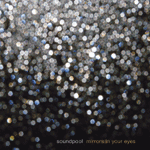- Administrator
- Albums and Singles
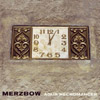
Masami Akita is always at his best when he is either working with a well-chosen collaborator (like Christoph Heemann or Richard Pinhas) or paying tribute to something he loves (like bondage photography or his pet chickens). This unusual and surprisingly listenable 1998 release falls squarely into the latter category, as Akita ferociously cannibalizes the progressive rock that meant so much to him as a teenager.
The title track opens the album in relatively straightforward Merzbow fashion, with a quasi-industrial locked groove that is quickly obliterated by an avalanche of blistering white noise.Atypically, however, the static eruption quickly subsides and the insistent rhythm again takes over.While Masami does not depart very much from his signature sound, the jousting interplay between rhythm and ruin is fairly dynamic and compelling.Then, at about the halfway point, the dust settles a bit and a lurching rock groove fades in.At first, Akita lets it unfold with little molestation, although it is a bit distorted and the cymbals sound warped and delayed.Then, of course, the floodgates are opened and the beat drowns in the expected sea of chaos (though not without a few textures that fall outside the usual Merz-palette).
The lengthier piece that follows, "Contrapuntti Indian," goes one step further and actually begins with a looped melodic guitar figure.Naturally, it is quickly ripped to shreds by another abrasive flurry of ear-shredding dissonance, but it pops up again a little later with an extremely cool stumbling tom-tom beat beneath it.Akita gets the balance between rhythm and savagery just right here: this is one of strongest pieces in the entire Merzbow discography.
The remaining three songs don’t dally with melody again, but they all follow a similar seesawing trajectory with tensely repeating rock snippets battling to stay afloat amidst tumultuous washes of abstract noise.The relatively short "Farsa Del Buen Vivir" is another of the album’s clear highlights though, due to its insistent quasi-Eastern rhythm and Akita’s especially unhinged blasts of feedback terrorism.Merzbow’s white noise assault is far more effective when it broken up with oases of structure and space than as a punishing and unrelenting hour-long roar.
It is very easy to focus on the fact that Masami has spent the last few decades repeating himself to the point of self-parody, but it is also impossible to deny that he has nevertheless remained a reliably distinctive and crushingly visceral artist.He may only have one trick, but it’s admittedly a pretty great trick (even fish raining from the sky would get boring if it happened every day).On occasions such as this, when Akita steps out of his comfort zone into a different dynamic context, it is possible to experience his vicious onslaught with fresh ears and be floored all over again. Aqua Necromancer often gets unfairly lumped in with the various "Merzbow with drums" albums, but that completely misses the point.Masami Akita has no intention of maintaining a groove here- rather he has choreographed a frenzied struggle between order and entropy.This is the sound of rock music being torn apart by a pack of snarling wolves, but not without a fierce struggle.
Samples:
 
Read More
- Administrator
- Albums and Singles
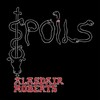 Sometimes the only way to move ahead is to fall behind the times. On his fifth solo album, Alasdair Roberts continues his run as one of the most eloquent advocates of traditional folk music. The eight originals on Spoils possess a ragged, arcane beauty that seem out of pace with the modern world, which makes them all the more striking.
Sometimes the only way to move ahead is to fall behind the times. On his fifth solo album, Alasdair Roberts continues his run as one of the most eloquent advocates of traditional folk music. The eight originals on Spoils possess a ragged, arcane beauty that seem out of pace with the modern world, which makes them all the more striking.
Roberts is often lauded for his elaborate diction, and rightly so for he can stack archaic words in multisyllabic rhyme with a deceptive ease. He is able to keep cadence and melody in his voice despite the poetic gymnastics of his writing, barely pausing over ten dollar words like "bilious" and "saturnine." That would be enough to prove him as more than just a hack, but there is content along with beauty in his language.
The numerous obscure references in Roberts’ lyrics reveal an encyclopedic mind, able to grasp culture by its roots as well as by its branches. The breadth of his knowledge gives the songs a visionary aspect. In "The Flyting of Grief and Joy," Roberts recounts centuries of creation and destruction, singing "A tithe of skin, a toll of bone, a bloody libel burning/In Jericho and Babylon, eternally returning." And though Roberts has a historian’s eye for detail, his passion quells any suspicion that his lyrics are over-studied.
Regardless of the source material, Roberts’ music has the honesty of personal revelation, even if he is taking the persona of another. When he sings from the perspective of Ned Ludd, the effect feels artless, as if Ludd’s grudge against the industrial machine was Roberts’ own. The effect is only broken when Roberts rejects the vision, saying "that’s only what this guitar puts into my mouth," a blunt but effective reminder that singer and song are two different things. Yet if his artistic voice still comes off as out of date, it is because so much music today does not reach outside the narrow lives of its creators.
For all the fire and brimstone that he can summon against the modern world, Roberts can take on more roles than just the prophet standing in judgment. His voice suits more personal subjects just fine, as on the album’s closer "Under No Enchantment but My Own," a delicate song about a break-up. Roberts lingers over the verses like man recalling a bittersweet memory, at once savoring and regretting the moment. He takes the perspective of a man hard-bitten by experience, singing "All too familiar/A thing a road reversed reveals."A tone of genuine loss pervades the song, ending Spoils on a tone very different from Roberts’ persona as a visionary lawgiver.
So much poetry is contained in the lyrics that it is easy to neglect the music that accompanies it. In Spoils, Roberts sticks to loose folk-rock arrangements similar to genre touchstones like Crazy Horse or the Incredible String Band. His songs are punctuated with resounding cymbal crashes and long dramatic guitar electric guitar chords. In the past, some of Roberts’ songs have suffered from flat arrangements, but on Spoils he wisely relegates ennui to being a subject matter rather than a compositional principal. Roberts is at his best when his backing band pushes him forwards, as they do in "Ye Muses Assist," where acoustic guitar and flute bob up and down together in an infectious riff and are broken up by thick snarls of feedback.
Evident as his talents are, Roberts seems in danger of sliding into a respectable but nonetheless unwarranted obscurity. His music elicits more of a grudging respect than genuine enthusiasm.The popular fetish for constant innovation harms the appreciation for traditional folk music, regardless of how radical and deconstructed it is.Roberts himself has stated in interviews that he sometimes feels "trapped" in his attachment to the old songs, but the anachronistic character of his music is one of its most distinguishing characteristics. Perhaps Roberts is mistaking a position of strength for one of confinement.While the majority confines their interest to the commonplace, he at least is one that is looking outwards for inspiration. If that is behind the times today, chances are that Roberts will fare better tomorrow.
samples:
Read More
- Administrator
- Albums and Singles
 Now Wait For Last Year is a masterpiece of understated electronic elegance. Like the hallucinatory drug JJ-180 from the Philip K. Dick novel which the album is named after, these songs have the ability to bend time, only in this case Caroline has utilized a synthesizer for the purpose of warping temporal perceptions. No heavy handed tricks or tomfoolery seem to have been used in achieving this effect. With her delicate touch, she created a pleasing batch of songs perfect for rainy evening meditations.
Now Wait For Last Year is a masterpiece of understated electronic elegance. Like the hallucinatory drug JJ-180 from the Philip K. Dick novel which the album is named after, these songs have the ability to bend time, only in this case Caroline has utilized a synthesizer for the purpose of warping temporal perceptions. No heavy handed tricks or tomfoolery seem to have been used in achieving this effect. With her delicate touch, she created a pleasing batch of songs perfect for rainy evening meditations.
Caroline K was a member of The Pump and a founder of Nocturnal Emissions. Also alongside Nigel Ayers she co-founded Sterile Records, a label notable for being the first to release music by Lustmord and other underground acts from the early '80s. She sadly passed away in 2008, leaving behind only this one solo record, the first release of Earthly Delights in 1987, an imprint which Nigel started after dissolving Sterile Records the year before (having grown tired of the medical and military metaphors he felt dominated the industrial noise music crowd). Luckily for this reissue a suite of three songs titled "Between the Spaces" have also been included, their fragile beauty a far cry from the often times spastic and sputtering noise heard on The Pump and early Nocturnal Emissions.
The album opens with "The Happening World," a massive long player of 20 minutes. Starting with a maximum of oscillations, a heavy throb reminiscent of de-tuned warning sirens soon enters the fray, forming the centerpiece of the song. A banshee like howl eventually pierces the wall, and continues to cry, building up a tension that is held until the very end. A bell like cadence of soft tinkles eventually crumbles the entire ominous structure.
"Animal Lattice" starts with a simple drum machine loop—a steady snare like tap occasionally punctuated by a sharp hits—repeating with minimal variation for the rest of the song. The rhythm is complimented by a low and resonant blasting sound that conjures images of primitive woodwinds. What could be Caroline K's voice, as sampled by a keyboard and saturated in reverb, plays soft notes that echo underneath. The primitive feel of the song is contrasted with simple keyboard lines that shimmer and dance across the top. In "Chearth" these melodious keystrokes are the highlight, holding an air of buoyant joy against other sounds that are beneath its grace: churning pools of miasmic sludge and hissing gasps of steam from creaking aged machines.
"Tracking With Close-Ups" continues with sheer tones sustained along a glimmering line, arpeggiated notes climbing and descending, and the unmistakable hand-clap sound of a drum machine. I don't know if this song ever made it as a hit on the dance floor, but I think it would fit well into the end of a club DJ set, helping people wind down by lowering their heartbeat back to normal. "Leaving" is one of the most iconic songs on the disc, and the last song on the original album. With the sound of cars driving past through mist and rain it creates a mood of dark ambivalence as the keys are played in a way that is as unsettling as it is unwavering. It has a very cinematic quality about it, and if I had heard it before knowing who it was, I might have thought it was something by Goblin for a Dario Argento movie.
There is a calm assuredness about "Between the Spaces 1-3," markedly different from the feeling of underlying paranoia on the previous five songs that made up the original album. Of course it makes perfect sense for an album named after a Dick novel to have a paranoid feel, but I am relieved to be ushered into a glowing realm of light for the finale. "Between the Spaces 2" contains brief chirps whose afterimages linger to create a feeling of warm enclosure, while a harp like melody drifts endlessly back and forth. The third part of the sequence contains the sound of cars passing in the rain again, or the beat of the surf up against the shore. The similar sounds in "Leaving" created a sense of dread, where here they promote a feeling of solemn transcendence.
Unlike Nigel, Caroline chose to drop out of the public eye, all the while remaining a good friend with him, later marrying his brother (and fellow band-mate from those early years in The Pump and Nocturnal Emissions) Danny Ayers. At last reissued in 2010 this album is a fitting tribute in memory and honor of a musician who helped forge one of the UK's most legendary groups from the avant-garde.
samples:
 
Read More
- Administrator
- Albums and Singles
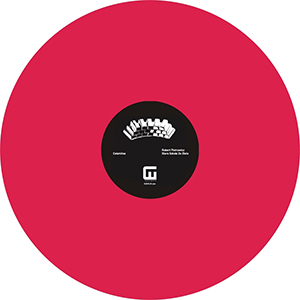 Piotrowicz's newest release is a relatively concise 12" single that hearkens back to his early days in a multitude of ways. The title itself translates as "Old School Made of Gold" in English, and the two songs included were originally recorded in 2010 and 2011 (but remixed this year). But even more indicative of its throwback nature is the fact that these two pieces were completely composed on modular synthesizers in a more immediate method of composition, rather than the varying techniques he has used in recent years. The final product is a single that is reminiscent to some of the earliest work I have heard from him, yet feels entirely fresh and contemporary within his discography.
Piotrowicz's newest release is a relatively concise 12" single that hearkens back to his early days in a multitude of ways. The title itself translates as "Old School Made of Gold" in English, and the two songs included were originally recorded in 2010 and 2011 (but remixed this year). But even more indicative of its throwback nature is the fact that these two pieces were completely composed on modular synthesizers in a more immediate method of composition, rather than the varying techniques he has used in recent years. The final product is a single that is reminiscent to some of the earliest work I have heard from him, yet feels entirely fresh and contemporary within his discography.
"Calamitas" begins with Piotrowicz adjusting his knobs and connecting his patch cables to effectively mimic the sound of a vintage organ:a thick and heavy tone that waivers between melodicism and dissonance.He maintains a spacious, open feel to the piece while keeping the synth passages complex and dynamic, swelling in volume and retreating to quiet.The piece hits saturation points of pure sustained tone, after which he scales everything back to build up again. Before its abrupt conclusion, the pitches are switched to more polarized high and low frequencies to end on a slightly coarser and more forceful note.
The other side, "Ice Walk," leads off with a pulsing, sequenced sound rather than the sustained, expanding tones of "Calamitas."On the whole it is a more dissonant, menacing sound in comparison, shifting into massive expanses of sound with buzzing drones mixed with lurching pulses.An ugly concrete expanse stretches out, with an overall vibe in league with early Throbbing Gristle and SPK.Even still, Piotrowicz has composed a song that slowly slips out of its structure, becoming more and more erratic in its closing moments as it collapses in a sputtering fit of decay.
Robert Piotrowicz has expanded his stylistic repertoire in recent releases to include more academic, electro-acoustic arrangements, and even recently stepping into the world of opera.For those reasons, Stara Szkoła Ze Złota has more than a bit of nostalgic feel for his earliest (though I hesitate to say simpler) works.There is a focus and purity to the sound of these two songs that make them sound so new and immediate today though, and still fits in perfectly with his ever expanding catalog.
samples:
 
Read More
- Administrator
- Albums and Singles
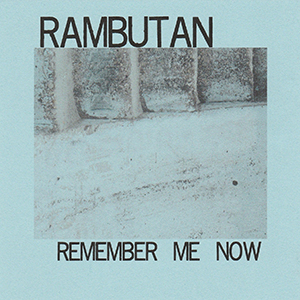 As two of the more recent works from the prolific Eric Hardiman (who also performs and records as a member of Century Plants, Twilight of the Century, and a slew of other projects), Remember Me Now and Surface Language are distinctly different facets to the Rambutan project. The former is a diverse collection of instrumentation and sound, from found processed recordings, improvised percussion and guitar. The latter, however, has a more consistent focus, built from repeating motifs and loops fitting a more tautly structured composition. Both, however, capture Hardiman’s penchant for bending objects and instruments into often unexplainable sounds, yet result in nuanced compositions of melody and abstraction.
As two of the more recent works from the prolific Eric Hardiman (who also performs and records as a member of Century Plants, Twilight of the Century, and a slew of other projects), Remember Me Now and Surface Language are distinctly different facets to the Rambutan project. The former is a diverse collection of instrumentation and sound, from found processed recordings, improvised percussion and guitar. The latter, however, has a more consistent focus, built from repeating motifs and loops fitting a more tautly structured composition. Both, however, capture Hardiman’s penchant for bending objects and instruments into often unexplainable sounds, yet result in nuanced compositions of melody and abstraction.
Remember Me Now is more of an album in its structure and presentation, with 11 pieces of variable lengths that draw from all different facets of the Rambutan sound.Pieces such as the opening "Petrified" and "Sliding Scale Deviance" capture his mostly amelodic, free improvisation work.The former is all crunchy scrapes panned left to right while chiming and gentle glassy sounds are stretched over top.The latter begins with the metallic vibrating of bass guitar strings that could just as easily be vibrating springs, creating anything but a conventional rhythm. "Sliding Scale Deviance" may have Hardiman adding some lighter electronic sounds to the mix later on, but that grinding string scrape is what makes the piece the most memorable.
Guitar acts as the focus on "Kill The Lights," which slowly builds up from complex, intertwining layers of slightly less mangled instrumentation."If I Can’t Be Wrong" features rather untreated guitar playing towards its conclusion, beginning with fluttering alien noises and an overall sense of moving forward and backward, but never standing still.The conventional and unconventional both blend excellently on two of the albums high points.The first, "I Should Be Tired" captures the delirium that can come from extended insomnia brilliantly via odd collaged noises and erratic pitch bends.Hints of melody and bizarre percussion slip through fleetingly, resulting in a piece of disorienting ambiance.Basic piano melodies and found noises are contrasted on "Fourth Day," coming together like a sparse musical composition combined with a piece of purely free improvisation.
samples:
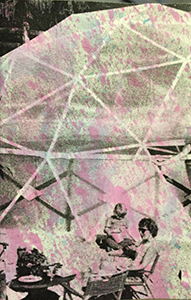
Surface Language, on the other hand, is two 15 minute pieces that stay in a more constant, focused mood rather than the eclecticism of Remember Me Now.Ghostly electronics and strange humming feedback make for the foundation of "The Surface of Language."Hardiman adds and subtracts layers with regularity, maintaining a consistent structure but never letting it pause for long, eventually drifting off into a galaxy of cosmic electronics.The other piece, "The Language of Surface" is built upon echoing loops and hushed rhythms.Again he constructs the piece slowly, with the alternating pitch of chiming percussion bouncing the mood between light and darkness.Slowly he nudges the piece towards a noisier, more chaotic conclusion compared to how it began.
Remember Me Now is the more diverse and wide-ranging of these two releases, but for that reason it jumps all over the map as far as tone and mood.In contrast, Surface Language makes for two more focused and consistent compositions, but also less variation.While they may be different, both are brilliantly executed, and both releases capture Hardiman’s singular, powerful approach to creating music that sounds like no one else.
samples:
 
Read More
- Administrator
- Albums and Singles
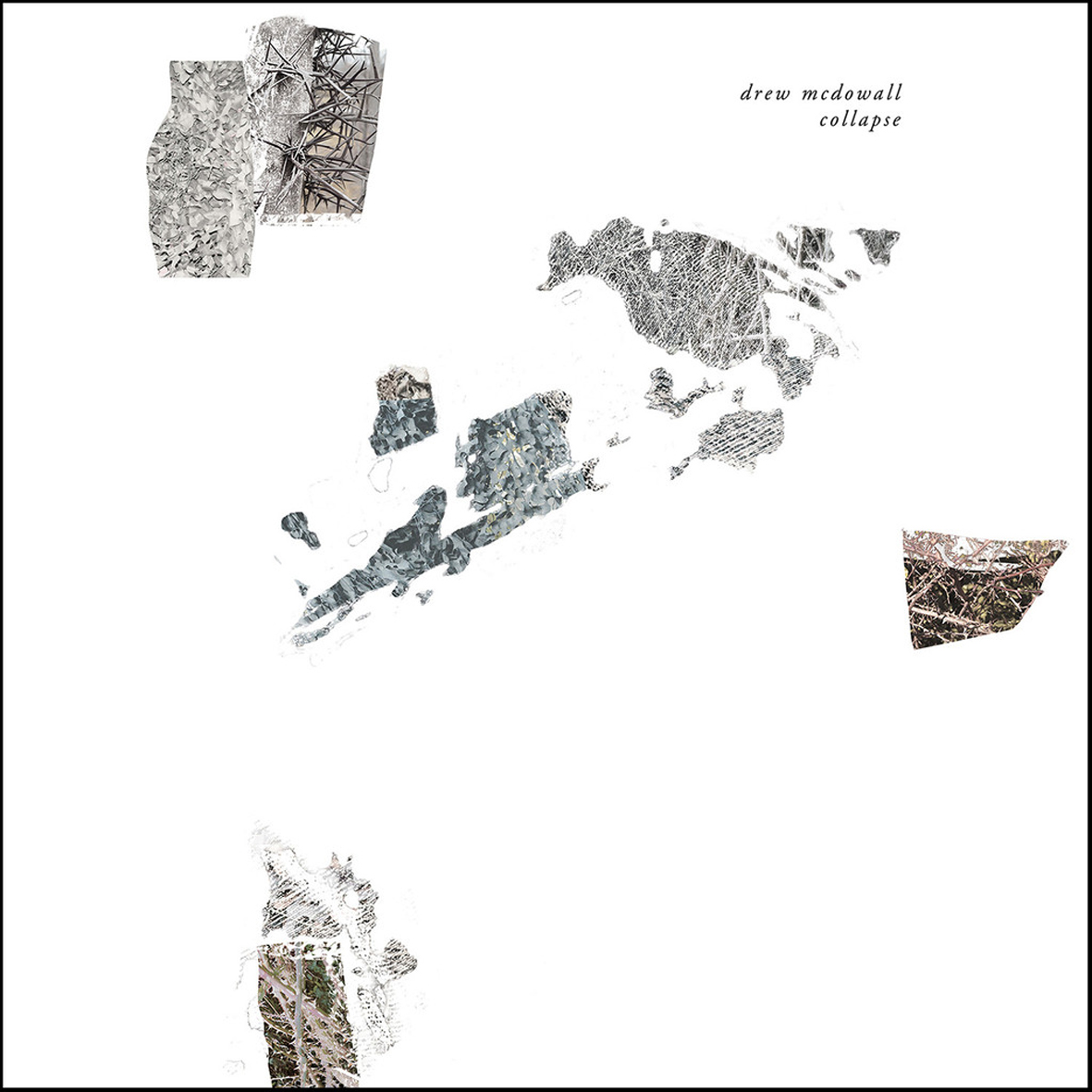 Somehow Drew McDowall has managed to be involved with the most interesting fringes of electronic and experimental music for over three decades without ever stepping into the spotlight himself, most notably working with Psychic TV during their ‘80s heyday and teaming up with Coil throughout the '90s.  Lately, he has mostly been quietly focusing on occasional remixes and soundtrack work, though he intermittently records as half of modular synth duo Compound Eye.  Collapse is a bit of modular synth album too, but it sounds almost nothing like Compound Eye.  Instead, it intermittently sounds like a great unfinished Coil album (when it does not instead sound like a collage experiment or a modular synth improv session).
Somehow Drew McDowall has managed to be involved with the most interesting fringes of electronic and experimental music for over three decades without ever stepping into the spotlight himself, most notably working with Psychic TV during their ‘80s heyday and teaming up with Coil throughout the '90s.  Lately, he has mostly been quietly focusing on occasional remixes and soundtrack work, though he intermittently records as half of modular synth duo Compound Eye.  Collapse is a bit of modular synth album too, but it sounds almost nothing like Compound Eye.  Instead, it intermittently sounds like a great unfinished Coil album (when it does not instead sound like a collage experiment or a modular synth improv session).
Collapse opens in somewhat counter-intuitive fashion, as three-part "The Chimeric Mesh Withdraws" stretches out for almost 20 minutes and takes quite a while to fully come together: initially, it is just an ominous and amorphous haze of echoing clicks, disjointed piano, and somewhat shrill and nightmarish synth whines.  After about eight minutes, however, McDowall’s floating and seemingly improvisatory hellscape gives way to an eerily buzzing and oscillating synth motif and "Chimeric Mesh" blossoms into a thing of disquieting and alien beauty.  It is also around this time where Coil comparisons become absolutely unavoidable, as the haunting central theme is increasingly buffeted by peripheral electronic flourishes that resemble giant swooping robotic birds of prey.  By the end, it completely makes sense why McDowall wanted to lead off with such a piece, as it is a gloriously sinister, hallucinatory, and weirdly melodic mindfuck.  This is exactly the sort of thing that obsessive Coil fans have unknowingly been waiting for.
The following "Hypnotic Congress" is nearly as stellar, but considerably more condensed, launching immediately into a futuristic and mechanized-sounding pulse that becomes increasingly more textured and substantial.  Around the halfway point, it transforms into something considerably weirder, morphing into a clanging, lurching industrial rhythm beneath a shifting, artificial-sounding vocal sample that sounds like an infernal choir of damned souls.  It is quite a wonderfully menacing and inhuman-sounding piece and a perfect continuation of the momentum started with "Chimeric Mesh."  Unexpectedly, however, the remaining three songs take somewhat diverging paths.
On "Through is Out," McDowall is assisted with some violin from Nicky Mao (Hiro Kone), weaving a considerably warmer and more human-sounding spell.  There is still some mindwarping aberrance to be found though, as McDowall’s synthesizers take on a sickly, strangled sizzle as the piece gradually descends into darker and more melancholy territory.  The brief "Convulse," on the other hand, is basically little more than a collage experiment, as a female voice (or two?) endlessly repeat the phrase "I convulsed" over a wobbly and echo-heavy rhythm.  Later, the closing "Each Surface of Night" takes the album into a considerably more drone-centric direction, largely eschewing anything deviant or nightmarish in favor of a dense, slowly undulating thrum before belatedly perking up into an understated crescendo of twinkling and delay-enhanced minor-key arpeggios.  That makes for an odd and somewhat perverse ending, as the final moments sound like an escalation into a more structured and melodic piece that never comes.
Collapse is a difficult album to form a solid opinion on, as it frequently flirts with greatness while simultaneously highlighting why McDowall has avoided recording a solo album in the past.  The main issue is that Drew seems to be primarily an "idea man," albeit one who has quite an impressive attention to detail and texture (he gets some brilliantly twisted sounds out of his synths).  He is not a particularly great composer though.  Consequently, Collapse is filled with dazzling moments that either never quite make the leap into something more, go on a little too long, or get diluted by somewhat meandering surroundings.  Also, the final three pieces make it feel like McDowall finished a wonderful album, then realized that he needed to find another 15 minutes of material to fill the second half of the record.  They do not exactly feel like filler, but they do feel like experiments or sketches that are not completely in line with the striking, distinctive, and focused one-two punch of "Chimeric Mesh" and "Hypnotic Congress."  I like those two pieces a lot, so I guess that means I like Collapse a lot, as they take up most of the album  And I do like Collapse a lot–it just feels more like a prodigious talent in need of a foil than it does the epic, well-deserved "coming-out party" that it could have been.
 
 
 
Read More
- Administrator
- Albums and Singles
April 27, 2010
US LP/CD Killer Pimp PIMPK015
side a
- Stars Fall
- Never Make You Cry
- Breaking Up
- For Her Smile
- Marianne
side b
- Silhouette
- Don't Leave Me Behind
- Someday - [MP3]
- It's Too Late
- Regret
LP comes with download code to download free MP3s of the album.
CD comes with enhanced content featuring music videos and bonus MP3s.
Ceremony - "Someday" by killerpimp
Paul Baker - vocals, guitar, bass, drum machine
John Fedowitz - vocals, guitar, bass, drum machine
The LP & CD from Ceremony is finally here! 10 brilliant pop songs super charged with amplification and distortion to make an incredible mix. Before A Place To Bury Strangers, there was Skywave, a three piece noise pop band from Fredericksburg, Virgina. When Ollie left to move to NYC, Paul and John remained and reorganized as Ceremony. While there will be undeniable comparisons made to APTBS (they still remain friends and share an affinity for loud guitars), Ceremony employ a songcraft far more focused on making catchy pop tunes than blowing out speakers and eardrums. The LP comes with a special download code to download MP3s of the entire LP while the CD comes with bonus enhanced content of four music videos.
For live dates, videos, and more information see myspace.com/ceremonytheband
"With all the deviation in the shoegaze sound, Virginia's Ceremony is proud to stay firmly grounded in the roots of the genre. After the demise of Skywave, a band considered by many to be responsible for the resurgence of shoegaze in America, bassist Oliver Akerman formed the incredible A Place to Bury Strangers, and remaining members Paul Baker and John Fedowitz formed the equally excellent Ceremony. Picking up directly where Skywave left off, the duo's guitars make a tremendous amount of noise thanks to some serious pedal magic. Blisteringly loud washes of guitars are as piercing as they are soothing, contrasting the lo-fi drum machine rhythms tucked just below the mix. Baker.s vocals add great texture, sounding relaxed and calming amongst the breaking dance beats and all encompassing storm of guitar effects." - Exploding In Sound
"Much like the loudness that pervades such noise rock, Ceremony feature raucous pop hooks and riffs that surmount the loudness. The bond between them and A Place to Bury Strangers is undoubtedly felt but they've captured their own appealing facets. Although there is plenty of drive, it's a noisy explosion that unquestionably delivers a strong jolt that resonates for a long time after it ends." - Bryan Sanchez, Delusions of Adequacy
"thunderously romantic Factory Records guitar/bass interplay, lo-fi drum machinesᾹbut as far as what it sets out to do, it succeeds." — Marc Hogan, Pitchfork, January 15, 2010
"Creating noisy, brilliant shoegaze like APTBS, Ceremony's tunes are a bit more on the indie pop side, making for an interesting and brilliant mix of influences." - Girls Sold Out
"burning frequencies, dark noisy pop, electronic drumming, a bath of guitar gears like phaser, rat, reverb" - Komakino
"some very fine noise-pop" - Built on a Weak Spot
"Ceremony's music is a superb hybrid of dark noisy pop, shoegaze, and electro; the result is a sound both unique and nostalgic." - Superstarcastic
"Utterly exhilarating" - Opus
Read More
- Administrator
- Albums and Singles
April 27, 2010
US LP/CD Killer Pimp PIMPK016
side a
- Mirrors In Your Eyes
- But It's So - [MP3]
- Kite of Love
- Makes No Sense
- Sparkle in the Dark
side b
- I'm So Tired
- That Sunny Day
- Shelter
- Listen
LP comes with download code to download free MP3s of the album.
CD comes with enhanced content featuring music videos and bonus MP3s.
Soundpool - "But It's So" by killerpimp
Kim Field - Vocals, Q-Chord, Omnichord, Keyboard
John Ceparano - Guitar, Bass, Vocals
Mark Robinson - Keyboard
James Renard - Drums
Sanford Santacroce - Bass
Mastered by Jeff Lipton at Peerless Mastering
The explosive third album sees this NY-based 5-piece stepping out onto the dancefloor,... without leaving their guitars and dreamy effects behind! After building a loyal following in the independent shoegaze scene Soundpool have enhanced their palette and, in turn, crafted a pop masterpiece. The nine songs are infectious, overflowing with strong bass hooks, driving beats, shimmering guitars, and Kim Fields' captivating, ethereal voice. The LP comes with a special download code to download MP3s of the entire LP while the CD comes with bonus enhanced content of five music videos.
A 12" EP is planned featuring remixes by Strategy, Colder, Lawrence Chandler (Bowery Electric), and GTO.
For live dates, videos, and more information see soundpoolmusic.com
"One of New York's reigning champions of dream pop are on the verge of releasing their third full-length Mirrors In Your Eyes. But rather than use the same formula all over again that gained their sophomore album Dichotomies+Dreamland success, the five piece took elements of what's moving New York today. Disco and electro-pop has found a new home in the corners of city and it also found its way into Soundpool's new album. This is going to be a mind blowing release for Soundpool. This is going to be an album TO GET which will be released by Killer Pimp April 27, 2010." - Twenty Seven Views
"Soundpool's heavily layered, dreamy tunes conjure up images of a queen soaring on a throne made of clouds, singing while her smiling band mates float beside her. Vocalist Kim Field's pure, angelic voice ranges from sexy, deeper notes to high-pitched melodies that mirror her keyboard playing. Active yet appropriately subtle, drummer James Renard works with the bassist to form a tight rhythm section, creating an urgent, driving groove. The nonstop, ethereal synths compliment the angular, sometimes haunting guitar, which recalls the sounds of 70s psychedelia, 80s pop and 90s shoegaze. Soundpool's supremely pleasing music leaves listeners with a euphoric high that.s only heightened in their dynamic live performances. - Becky Firesheets, The Deli
"thick, dreamy shoegazing guitar jumble, driven by an even thicker disco beat" - Max Sebela, Jezebel Music
"Post-shoegaze ambient dance with a canonball of cosmic sounds" - Kenyon, Advance Copy
"Soundpool would be an awesome Transformers character. Just think of the myriad of possibilities that this robot could transform into! Soundpool could be a gun that emits sonic frequencies consisting of disco, shoegazey and spacey funk." - Ventvox
"The best fucking band in the world!" - Ulrich Schnauss
"Reminiscent of French pop via Air or Stereolab... fine dream pop." - Pitchfork
"Captivating blend of shoegaze, space rock and wonderful soundscapes" - Radiofreedavid.com
"Few new artists match Soundpool's vocal delivery and sonic awareness" - Musicisnotdead
"Slowdive for the new millennium" - David Mansdorf, Losing Today
"When Lush wrote Sweetness and Light at the height of shoegazing, I wonder if they had anticipated Soundpool" - Brett Spaceman, EVILSPONGE
Read More
- Administrator
- Albums and Singles
April 27, 2010
US 7" Killer Pimp PIMPK017
- Leave Alone
- Walk Away
Released on the same day as Rocket Fire however neither appear on the LP.
Ceremony, "Leave Alone" on Killer PimpPaul Baker - vocals, guitar, bass, drum machine
John Fedowitz - vocals, guitar, bass, drum machine
Following the success of the Someday 7" single Killer Pimp will issue a 7" single of two exclusive non-LP Ceremony tracks on April 27th, the date of their full-length release, Rocket Fire.
The 7" is limited to 500 copies and neither song will not be on the LP or CD.
For live dates, videos, and more information see myspace.com/ceremonytheband
"some very fine noise-pop" - Built on a Weak Spot
"Ceremony's music is a superb hybrid of dark noisy pop, shoegaze, and electro; the result is a sound both unique and nostalgic." - Superstarcastic
"Utterly exhilarating" - Opus
Read More
- Administrator
- Albums and Singles
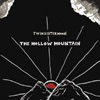 This brilliant and mind-bending solo opus by Natural Snow Buildings' Mehdi Ameziane was originally issued as an LP by Dull Knife in 2009 and sold out within hours. Fortunately, it has now been reissued and remastered and augmented with a massive amount of bonus material for those of us that weren’t fast or well-informed enough to catch it the first time around.
This brilliant and mind-bending solo opus by Natural Snow Buildings' Mehdi Ameziane was originally issued as an LP by Dull Knife in 2009 and sold out within hours. Fortunately, it has now been reissued and remastered and augmented with a massive amount of bonus material for those of us that weren’t fast or well-informed enough to catch it the first time around.
 
There are a lot of unusual things about Natural Snow Buildings, but the most notable (to me anyway) is how utterly detached they seem to be from the mundane and often petty world that the rest of us are stuck living in (both musically and otherwise).Instead, Solange Gularte and Mehdi Ameziane seem to inhabit a darkly magical and Edward Gorey-esque shadow reality. Also, they seem guileless and genuine in a way that is wholly foreign to modern human nature.Those are admittedly odd statements to make about a band, but Solange and Mehdi's recorded output provides excellent corroborating evidence.The duo are prolific, but each new album is released without fanfare, as though they had simply accumulated enough otherwordly material for yet another dispatch from their insular, self-contained universe.More significantly, though the duo tend to put a great deal of effort into beautiful art and packaging, they release everything in such limited quantities that it seems that they have a total indifference to any of the external rewards that might be reaped from producing great work.Or they’ll release a double-album as a free download (through some third party, of course).The simple act of creation seems to be the entire point and whether the rest of the world notices or gets a chance to hear it is largely irrelevant.
Another odd thing is that Mehdi’s vocals are quite feminine- in fact, critics often mistake him for a woman.More specifically, he sounds like a profoundly sad and somewhat ghostly Vashti Bunyan.The actual music, on the other hand, sounds exactly like the sort of album Shirley Collins might have made (but regrettably didn’t) after teaming up with the Current 93 milieu. Some songs, like the simple and sparse acoustic ballad "Bride of the Spirits," sound a lot like traditional Celtic folk (until the "Come to me, my only child- I’ll just eat your flesh" line, anyway).More often, however, the songs seem to come from a much more exotic time and place, such as the pagan drone of "Druids."While this mystique and timelessness is certainly deliberate and well-earned, some of the credit must be given to Mehdi’s exclusive use of instruments that cannot be associated with a fixed point in time, such as flutes, tampura, shruti boxes, and tambourines.
Despite the clear allusions to psych folk, traditional music, and modern drone/noise strewn all over the album, The Hollow Mountain still sounds like something entirely fresh and unique.Ameziane weaves all of his influences together in an unpredictable, ingeniously arranged, and complicated way, but makes it all sound like a seamlessly and organically unfolding dream.This is the kind of music that unicorns would make (if they had good taste): melancholy quasi-medieval ballads warp into field recordings of babbling brooks, clanging cathedral bells, or a chorus of happily chirping birds just as easily as they turn into evil-sounding drones or heavenly psychedelic fugues.The tone is similarly mercurial, as Mehdi’s sweetly melodic songs have a tendency to become menacing, ritualistic, or pastorally beautiful with little warning.It never seems jarring or clumsy either, although Ameziane's vocals can sometimes be oppressively sad when I am in the wrong mood.
I have not heard the original LP version of this album, so I cannot say how much effect Ben Nash’s remastering efforts have had on it.It’s a pretty lo-fi album, but not in a bad way- more in an immediate and raw way, but with a thin patina of hiss and distortion that suggests that it may have been recorded with just a microphone and an 8-track.Amusingly, the "bonus track" included here is almost 45 minutes long, making it essentially a "bonus album."Disorientingly, it is just as good as the main album and could have easily been released separately, but I’m sure Mehdi forgot about it as soon as it was done and moved onto something else.Regardless, more TwinSisterMoon is always a good idea, as Mehdi's artistry is best appreciated as complete immersion.
I haven’t tracked down enough of the voluminous Isengrind/Twinsistermoon/Natural Snow Buildings ouevre to effectively contextualize The Hollow Mountain within a hierarchy of essentialness (they’ve been working in extreme obscurity for 13 years now), but I can conclusively state that it is a beautiful and stunning album and that it is actually still available (a very rare occurrence indeed).Also, despite the fact that it has been retooled slightly for mass consumption, it still retains some of the duo’s characteristically ambitious packaging: the disc is (egolessly) enclosed in a booklet of Solange’s creepily surreal woodcut-inspired art.
Samples:
 
Read More
- Administrator
- Albums and Singles
 While perhaps known better for their lush, hazy guitar abstractions, the duo of Melissa Arpin-Duimstra and Scott Cortez are not afraid to push their sound even further into the reaches of the sonic galaxy, as this new reconstruction proves. Originally issued on a tiny Peruvian label in 2007, Chorus was a conscious attempt to remove guitars and instrumentation, and simply work with the sound of Arpin-Duimstra’s voice. For its reissue, the entire album is reworked yet again, using the tiniest of vocal fragments to weave a beautiful atmospheric tapestry of sound.
While perhaps known better for their lush, hazy guitar abstractions, the duo of Melissa Arpin-Duimstra and Scott Cortez are not afraid to push their sound even further into the reaches of the sonic galaxy, as this new reconstruction proves. Originally issued on a tiny Peruvian label in 2007, Chorus was a conscious attempt to remove guitars and instrumentation, and simply work with the sound of Arpin-Duimstra’s voice. For its reissue, the entire album is reworked yet again, using the tiniest of vocal fragments to weave a beautiful atmospheric tapestry of sound.
As expected from its development, the sound of Crwth is one that is more treated and distilled than its Chorus predecessor which, thankfully, is included as a free download, along with three additional reworked tracks that wouldn’t fit on the disc. The original material is closer in spirit to the band’s earlier work, though still full of cut and paste phonemes and what must be vocal snippets run through guitar effects pedals. While sounding very unlike their peers, there are still significant traces of a sound influenced by the likes of MBV, just with even less consideration for the conventional structures of pop music.
The new material allows Melissa’s natural voice to shine through at times, but the greater focus is on dismantling the syllables and breaths she provides into a variety of sounds, some which mimic traditional instruments, others which have no discernable origin. The opening "Dzai" leaves her gentle vocals out in the open, with little in the way of processing other than layering, which later surges into a sustained tone, with small phonemes morphing into a rhythmic click while others are processed into cello like low register swells of sound. "Vrhhu" allows the beautiful vocals to appear untreated, resembling a gentle, wordless lullaby as other bits of her voice are done up to sound like strings, providing a soft, gauzy bed for her angelic voice to rest upon. "Rhvr" also chooses to showcase the voice, with only the most subtle of reverberation and processed sonic punctuation to flesh out the sound.
In other cases, the voice is used simply as a starting point, and the outcome resembles something else entirely: "Glnkq" sounds much more like a complex synthesizer or laptop based composition, with its looped low frequency rhythmic pulse and shimmering pseudo-horn passages, and the cold minimalism of "Qlinglo," which channels distant strings and indefinable bassy frequencies. Even with little resemblance to its source material, few things other than the human voice can be capable of rendering such loneliness and despair that is captured on "Shemerr." While the palette that the sound is drawn from isn’t clear, the heavy emotions it conveys are rarely captured by anything other than the human voice.
When I first saw this listed on the upcoming release list from Line, I was a bit shocked. I knew the name sounded familiar, and a quick bit of research confirmed my instinct that Lovesliescrushing was a band associated more with the 1990s ethereal pop/gothic movement than anything else. Hell, they had releases on the Projekt label, definitely not something I would have seen as fitting in with this label’s preference for clinical and installation based compositions. However, the material here does fit in with the Line ethos, it just happens to have more of an organic core than many, such as myself, were expecting. The final product is a simply beautiful set of pieces that is consistent with the explorations in sound motive of electronic artists, but with a natural beauty and grace that few are able to mimic with their laptops and complex software.
samples:
Read More



